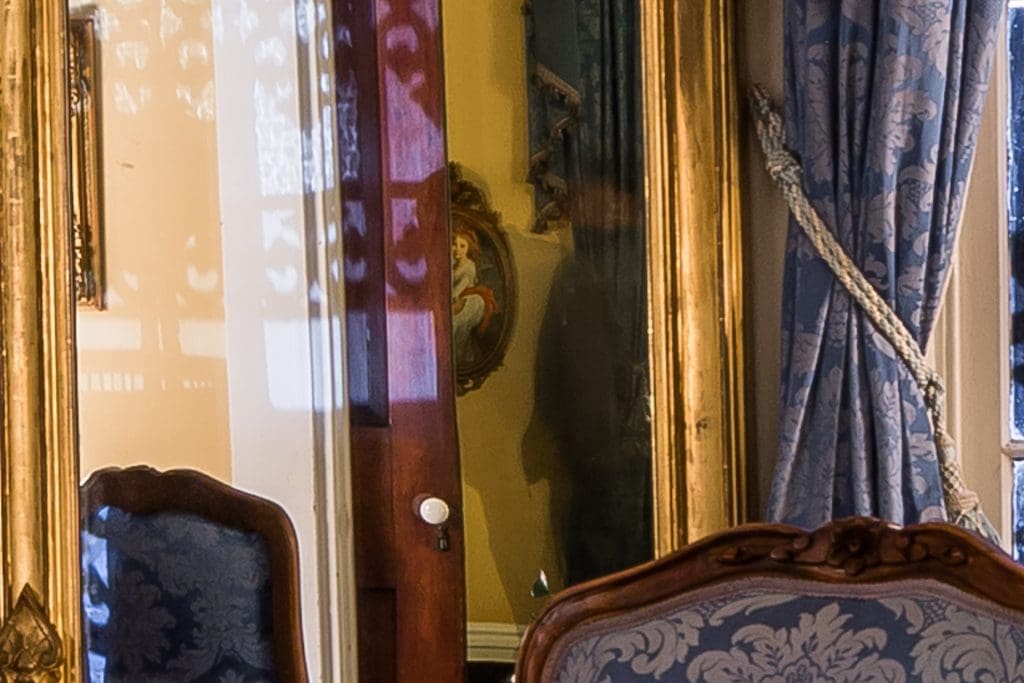Cedar Grove Mansion, Vicksburg, Mississippi
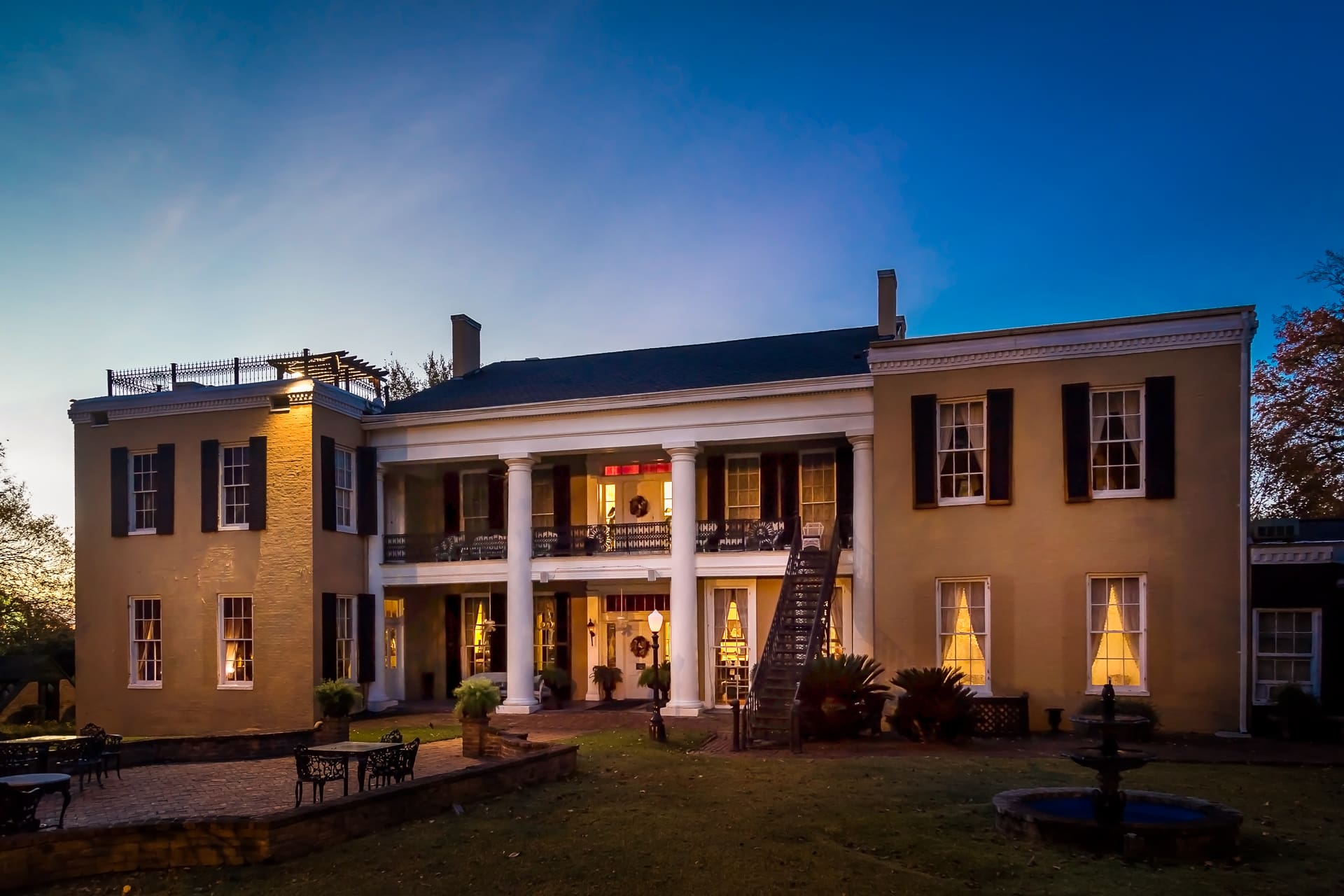
Cedar Grove Mansion is an Antebellum Greek Revival estate located in Vicksburg, Mississippi. At the time of this writing, Cedar Grove is a fully operational bed & breakfast that serves as one of the largest and most elegant in the South. It houses a restaurant, full bar, pool, and 33 rooms spread out over five historic buildings and gardens. Hidden on the top floor, next to the guest room where my 9 year old son (at the time) and I spent the night, is a door that leads to a rooftop deck with great views of the Yazoo Diversion Canal. The view was formerly of the Mississippi River before a sudden change in course. I visited and stayed at Cedar Grove in late November 2017 during a trip that through Vicksburg and Natchez.

Constructing Cedar Grove
John Klein, a wealthy entrepreneur with interests in a little bit of everything, commenced construction on Cedar Grove in 1840 with the intention of gifting the home to his future bride Elizabeth. While John built his future wife a home, I took my future bride to the Cracker Barrel and If you’ve ever had breakfast there, I think you know who won that battle.
Cedar Grove was to be a 2 and 1/2 story Greek Revival Architectural Style home with New Orleans-style cast-iron galleries and gazebo, statues, lush gardens, brick walks and fountains fed from an elevated cistern; all situated on eight acres amongst a grove of 25 cedars overlooking the Mississippi. I’ll give you one guess as to where the mansion may have earned its name.
By 1842, the main part of the home was completed and the 30-year-old John was granted permission to marry 16-year-old Elizabeth. They married and John made good on his intention to gift the home to Elizabeth. Eyewitnesses report that they still did not eat at the Cracker Barrel. Instead, they chose to go on a year-long honeymoon and shopping spree to Europe where they searched out rare furnishings for their home such as Paris window treatments, gold leaf mirrors dusted with 24K gold, Italian marble fireplaces, French Empire gasoliers, and Bohemian glass to place above the exterior doorways. Much of the art and furnishings survive and still reside within the home.
John and Elizabeth proceeded to have a boatload of children in their lovely home but, unfortunately, three of them did not survive past infanthood. That’s where our story of misfortune and tragedy begins.
The Civil War
In 1861, the greatest architect of all Southern Ghosts reared its head; the American Civil War. The War Between the States. The Great Rebellion. The War of Northern Aggression. The War for Southern Independence. Regardless of the name you choose to lend the war, to this day, it remains the saddest and bloodiest war in American History with approximately 750,000 deaths. To add perspective, that’s greater than the total combined American losses of every other war in our history. Including both World Wars.
The War landed on Cedar Grove’s doorstep (and literally in their parlor) in May of 1863. That marked the beginning of the Vicksburg Campaign. Union forces were already in control of Memphis and New Orleans. As the only high ground on the Mississippi between the two major cities, Vicksburg was the only thing standing in the way of splitting the Confederacy and opening supply routes for the North clear to the Gulf of Mexico.
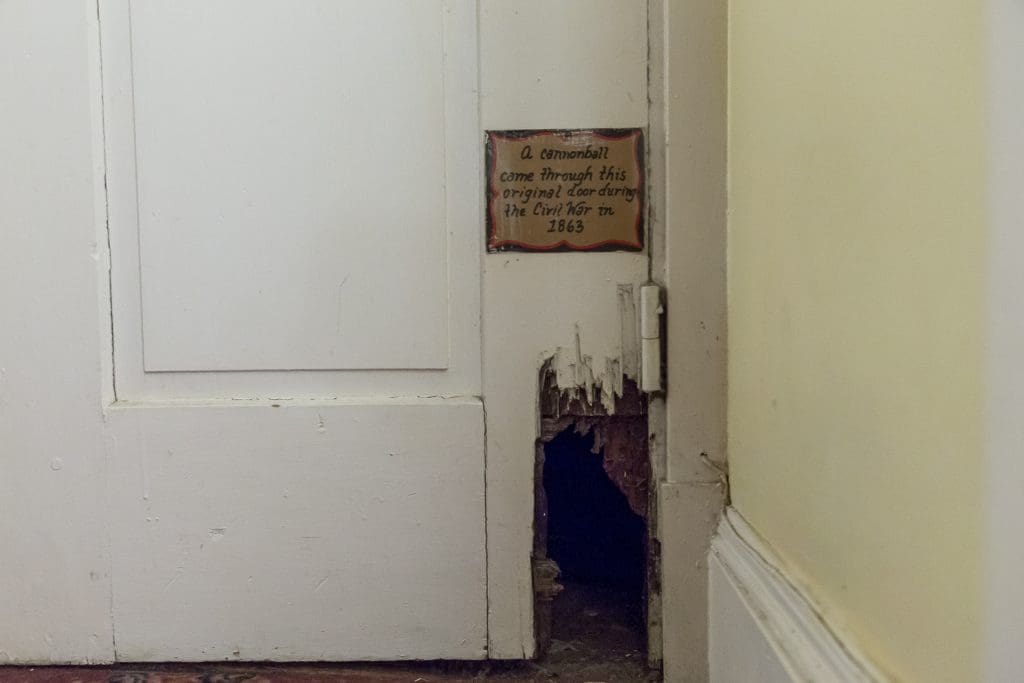
Door in the 3rd Floor Room my son and I stayed in. 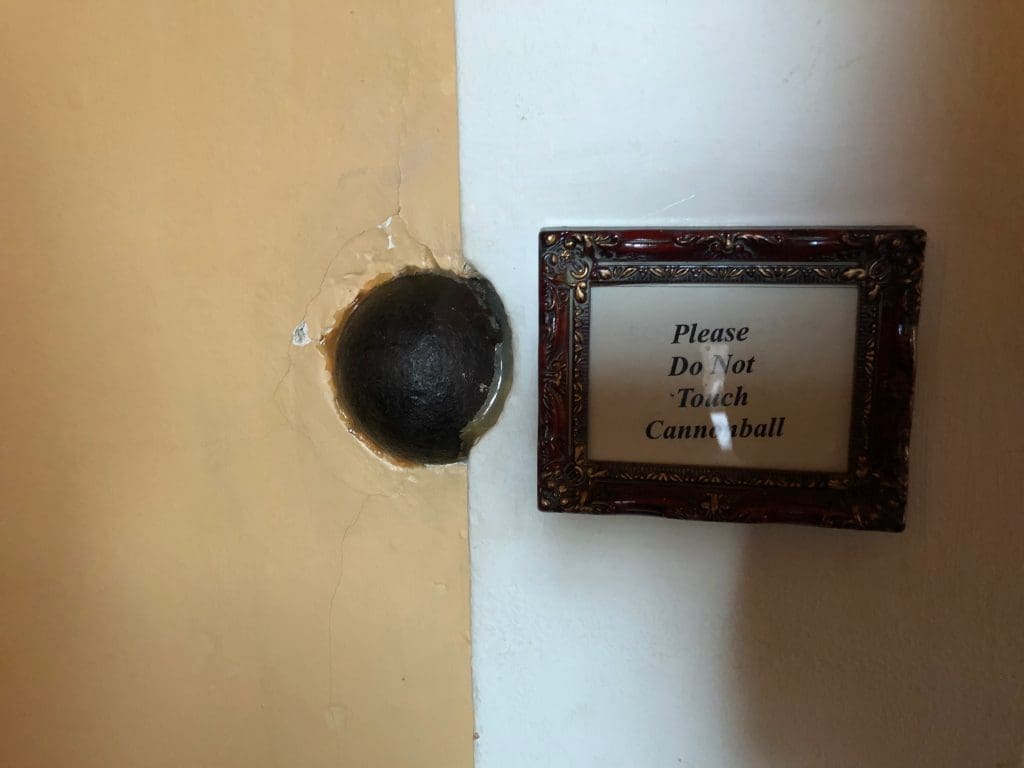
Civil War Cannonball lodged in the wall of the Gentleman’s Parlor on the main floor.
Over the course of the next several weeks, Union generals Grant and Sherman slowly squeezed the city of its resources and supplies while engaging in various skirmishes and battles. Citizens in the city starved. People were reduced to eating mules, horses, dogs, and any other meat they could get their hands on. Things got so bad that butcher shops began selling rats. Disease and sickness ran amok. Homes were in ruins from the 200 Union guns’ daily blasting of the city. Civilians dug hundreds of caves into the hillsides in hopes of escaping the thundering cannons. Cedar Grove didn’t escape damage. The bluff-top home was hit several times leaving her walls and floors beaten and scarred. Even today, you can visit Cedar Grove, see the cannonball holes, and marvel at the actual cannonball still embedded in the parlor wall.
A Fortunate Meeting and the Birth of Willie Klein
As the widely accepted story goes, Elizabeth, a native Ohioan, was pregnant and alone. John Klein had picked up and left to join the fight for Southern Independence. Naturally, she did the only thing that she could to protect herself and her unborn child; she fled the Vicksburg and took shelter in a log house near the Big Black River about 15 miles outside of the city.
Sometime between June 20, 1863 and July 4, 1863, Mrs. Klein’s path intersected with another native Ohioan and uncle by marriage, General William Tecumseh Sherman. Known as Cump to his friends, Cumpy to his wife, Old Uncle Billy to his soldiers, and the Devil incarnate to many southerners, Sherman obliged Elizabeth’s pleas for help to save Cedar Grove. In exchange, the mansion would be used as a field hospital and morgue until necessity decided otherwise.
In his memoirs, Sherman recounted the meetings with Elizabeth.
“In a small log house near Markham’s (the farm Sherman had placed his headquarters), was the family of Mr. Klein, whose wife was the daughter of Mrs. Day, of New Orleans, who in turn was the sister of Judge T. W. Bartley, my brother-in-law. I used frequently to drop in and take a meal with them, and Mrs. Klein was generally known as the general’s cousin, which doubtless saved her and her family from molestation, too common on the part of our men.”
Did you catch that? Almost every story (including a couple of books) I’ve ever read about Elizabeth and the birth of Willie/Siege of Vicksburg has her alone while John is off to fight for the South. But here, we have Sherman specifically referencing his encounters with the family at the log house. Were all the stories I read about John leaving his family bullshit? Once that seed was planted in my head, I started examining some of the widely accepted truths of this story and they began to lose a bit of credibility. Let’s dig in.
In April of 1861, John would have been 48. That’s pretty old for military service, especially in those days, but not unheard of. If a warm body showed up on the battlefield for the South, they weren’t going to turn him away. The age of forced conscription was 35 in 1863, and conscription to the CSA Reserves wasn’t raised to 50 until 1864. At that time, John would have been 51 and too old anyway. So, John was never forced to fight. That doesn’t mean that he didn’t, though, so I had to go a little further. From there, I dug into Civil War records. Guess what? No records of military service fora John Klein from Mississippi. That’s not the be-all-end-all fact that proves anything one way or another, but it is particularly damning to the story. The only record I found of John A. Klein was a Confederate Civilian Record. As a matter of fact, I never found a shred of tangible evidence that indicated John Klein served in the military at any point from 1861-1865. Another piece of information I found that appears to dampen the Johnny Rebel story is this; John Klein was appointed administrator of the Bobb Estate (of McRaven House fame) after John Bobb’s death in 1864. That would have been a hard case to work if Klein was away at war. Again, that doesn’t mean he didn’t fight for the South at some point, but the evidence of such hasn’t been overly forthcoming.
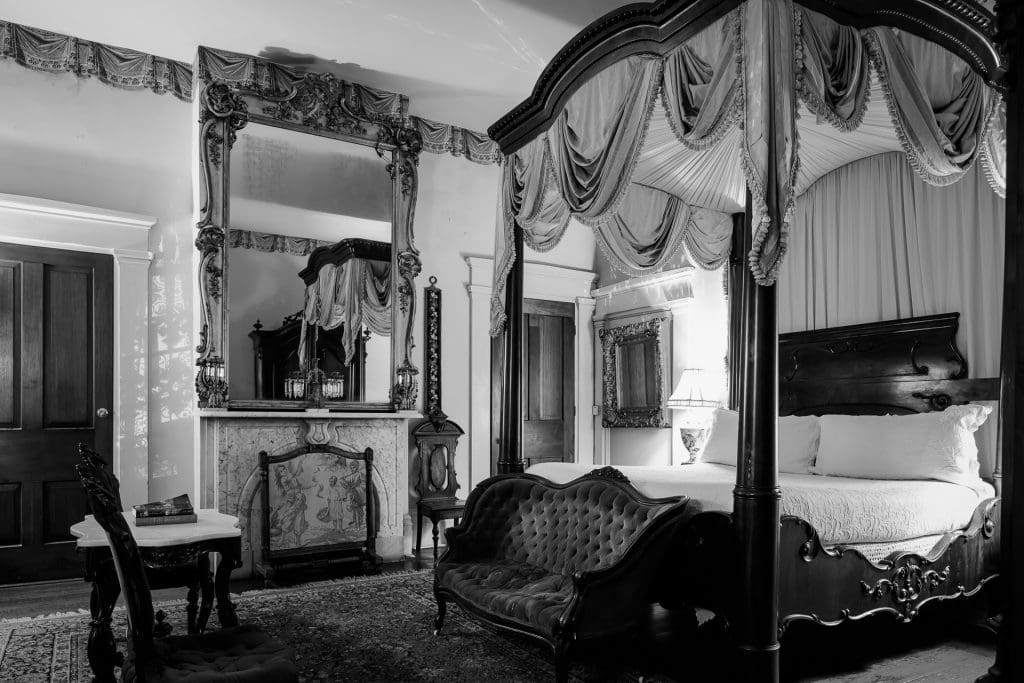
Let’s get back to the story. On July 4, 1863, the Confederates surrendered and the Siege of Vicksburg ended. Generals Grant and Sherman claimed the most crucial victory of the Western Theater and probably the most strategically paramount battle of the entire war. That Union victory also provided Cedar Grove with it’s first true claim to fame. General, and future 18th President of the United States, Ulysses S. Grant spent a night or three (depending on which source you believe) in the main floor master bedroom (now called the “Grant Room”). The canopy bed Grant slept in still remains in the room and most of the furnishings have changed very little. Had John really been “Johnny Rebel” (see what I did there?), I’m not so sure that the bed he was to sleep in every night for the rest of his days would have been saved from a massive bonfire. Fortunately for history buffs, the bed survived and guests may sleep in the same bed as a former Civil War General and President.
Fast forward nearly two months to September 3, 1863, away from the turbulence of Vicksburg…or at Cedar Grove, who the hell knows anymore, Elizabeth gave birth to William “Willie” Tecumseh Sherman Klein. Odd choice, don’t you think? The oft-repeated story adds that the name was to meant to honor the person that saved their home. If we hadn’t already laid a good foundation for the argument that John Klein did not participate in the Civil War, I feel like this would be the piece of information that puts it over the top. I’m sure Johnny Rebel would have been totally cool coming home to meet William Tecumseh Sherman. Again. You know, the guy that was complicit in battering and starving their home city.
Further binding the Kleins and Sherman, Willie T. S. Klein shared the same name as General Sherman’s 8 year old son William “Willie” Sherman. Unfortunately, though, the General’s son would only live 25 days past the birth of Willie Klein. While visiting General Sherman in Vicksburg, the boy fell ill with what was originally diagnosed as dysentery and malaria. General Sherman and his family immediately departed for Memphis up the Mississippi River. Willie’s condition worsened over the next few days until he was finally diagnosed with Typhoid Fever. Nothing could be done. William Ewing Sherman died on October 3rd, 1863.
General Sherman wrote of his departed son,
“Willie was, or so he thought he was, a sergeant in the Thirteenth. I have seen his eye brighten, his heart beat, as he beheld the battalion under arms, and asked me if they were not real soldiers. Child as he was, he had the enthusiasm, the pure love of truth, honor, and love of country, which should animate all soldiers….we were with him at the time and we all, helpless and overwhelmed, saw him die.”
General Sherman was already a talented tactician with plenty of battlefield successes, but he had not yet become the ruthless Sherman that went on to set fire to Atlanta, March to the Sea, and conquer the Carolinas. To this point, Sherman had, for the most part, sympathized with the southerners. He spent much of his military and educational career in places like Florida, Savannah, Charleston, New Orleans, and Baton Rouge (many people don’t realize that Sherman was the first President of LSU). That attitude changed upon Willie’s death. Sherman famously came to the following conclusion:
“War is cruelty. There is no use trying to reform it. The crueler it is, the sooner it will be over.”
He began to advocate the approach that Confederate General Thomas “Stonewall” Jackson had been a proponent of early on; a ruthless, “black flag” war. Stonewall and, later, Sherman wanted a war that would hit home with the public, not just the soldiers losing their lives on the battlefield. They needed to make the opposition realize the cost of continued battle. While it would bring more pain and misery in the short term, they felt that it was the best way to end the war sooner and save more lives. While Jackson couldn’t convince Robert E. Lee or Jefferson Davis to follow this approach, Sherman eventually succeeded in convincing the right people. It’s interesting to speculate about the effect the death of Sherman’s son had on the Civil War. Had Willie died before the Vicksburg Campaign, would Cedar Grove have made it through the war relatively unscathed? Had Willie survived, would Sherman become the merciless General that the Union needed alongside Grant to put an end to the war?
We’ll never know the answers to those questions, but, sadly, the General’s son wouldn’t be the only casualty named Willie Sherman in Vicksburg.
William “Willie” Tecumseh Sherman Klein
The Klein family eventually moved back to Cedar Grove. As you might imagine, the people of Vicksburg were a bit pissed off when William Tecumseh Sherman Klein strolled into town. Elizabeth said “my neighbors were hostile toward me and my son. They told me he would be cursed. I was proud to prove them wrong as he grew into a young man who was intelligent, bright, and handsome.”
Two months before Willie’s 16th birthday in 1879, though, he was involved in an accident. As with other parts of this story, information from the event is a bit sketchy. There are two predominant versions of the story and I’m not sure which, if either, is the truth.
Story 1: After returning from a hunting trip with a friend, the pair sat under a magnolia tree for a lazy nap. Some time had passed and the friend awoke. Pistol in hand and trying to stand, the friend accidentally shot Willie in the chest.
Story 2: After returning from a hunting trip with a friend, the pair sat on what is now the back step. The friend accidentally knocked over his rifle (makes more sense than a pistol), the gun discharged, and the fatal blow struck Willie in the chest.
Here, the stories converge. Willie was able to get to his feet and make his way toward the house, stumbling and staggering up the iron steps. One can only assume that he was trying to find his mother or father for help. He never made it to his destination. On the way up, Willie succumbed to his injuries and crumbled to the bottom.
Some reports say that Willie was shot in the back, not the chest. Others say that his own pistol/rifle discharged and dealt the fatal blow. Regardless of the exact circumstances surrounding the event, John and Elizabeth lost their son and never overcame their grief. John lived in agony for 5 years before his life ended and it is said that Elizabeth wore black every day until her death in 1909.
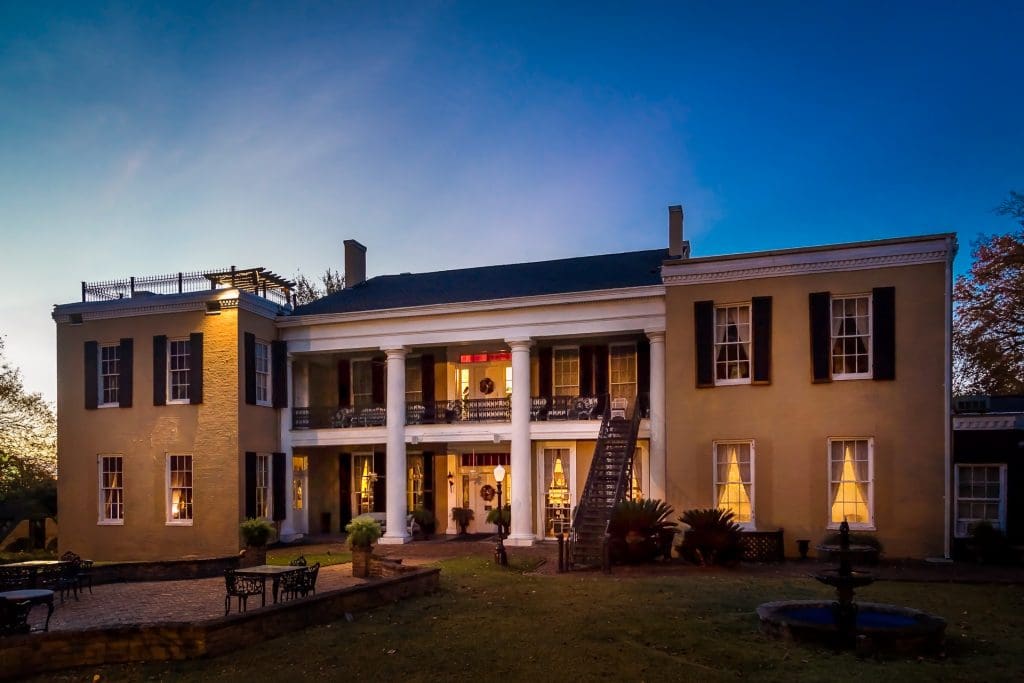
Cedar Grove remained with the family until 1919 when the property was sold and the Klein family remains were removed to a nearby cemetery. It has changed hands several times since. The only significant, heartbreaking, event of record that happened in the post-Klein era belonged to the Podesta family.
Not much information is available about the story, but the Podesta’s daughter endured a rough, mentally unstable life. She was in and out of mental institutions and had many problems. One night, in the ballroom, she shot herself in the head. Guests and staff comment with regularity about the sounds of late night screams, gunshots, glass breaking, and music emanating from the ballroom.
The Hauntings
Ain’t you haunted by the thousands of ghosts that flit about those deep and tangled ravines that make up Vicksburg? It was Vicksburg that cost me my Willie and I cannot but feel that it must be an unpleasant spot.
General Sherman to General Edward Ord following the conclusion of the Civil War
First, let’s summarize the things that have been a part of Cedar Grove’s history. Infant deaths. Civil War Hospital. Civil War deaths. Civil War morgue. Accidental shooting death of a son. Family remains buried on the property were moved. Suicide. Those are the things we know of. If any place can be haunted, this amount of tragic history should guarantee it.
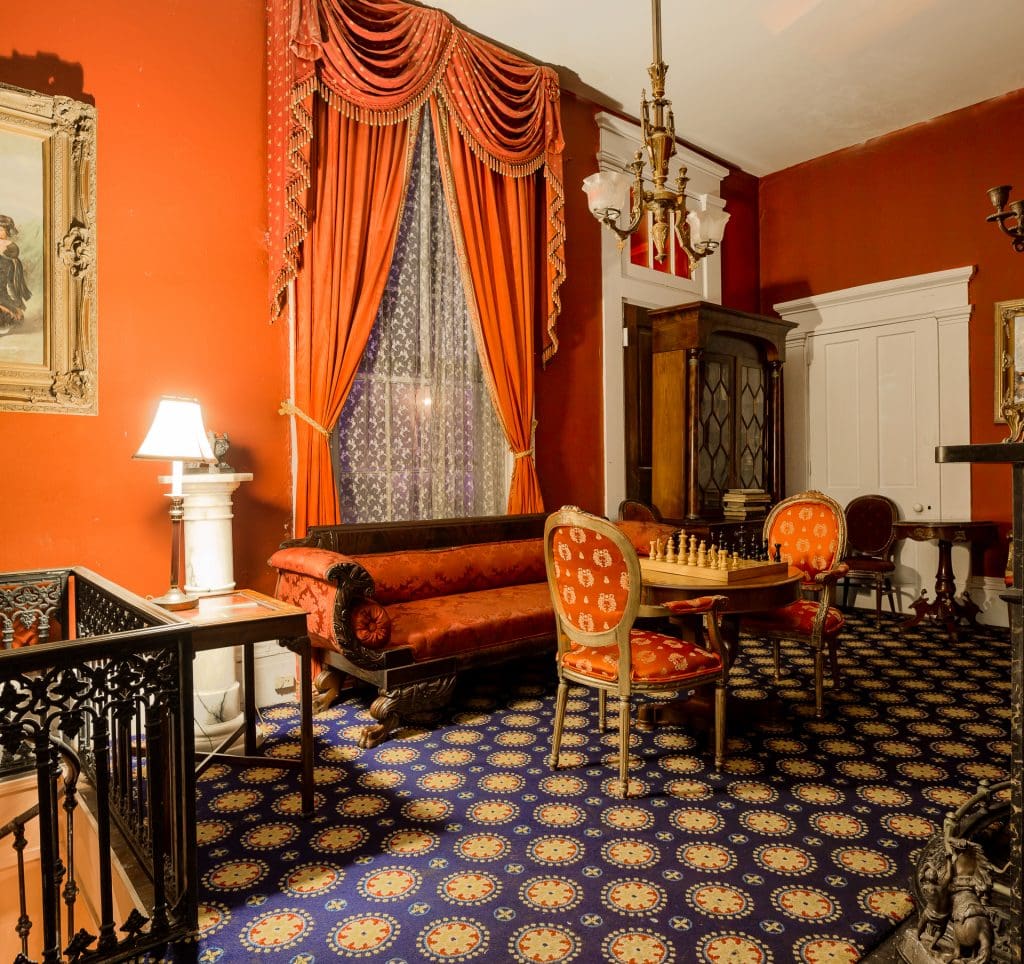
Husband, father, and architect of the home, John Klein’s heart and soul were in Cedar Grove; maybe his spirit resides there now as well. John spent a lot of time in the gentleman’s parlor on the main floor. He liked to sit in his favorite chair near the home’s most visible reminders of the Civil War and smoke his favorite pipe. Just a few feet from that chair is a Union Cannonball still lodged in the wall. Scanning the floor near that cannonball, John could see the blood-stained hole created by another cannonball. Ulysses S. Grant spent the night across the hallway. His entire home was a Union hospital. Below his parlor was the Union morgue. Elizabeth’s Uncle was General Sherman. Sherman, known at the time for his love of dancing, reportedly danced in Cedar Grove’s Ballroom. Their son now donned the name synonymous with that Devil of the North. They were able to keep their wealth. John and Elizabeth’s lives and home were brimming with Union ties and history. Though I didn’t see it written anywhere, I imagine that the Kleins were dealing with accusations of Union loyalty and/or favoritism. The evidence certainly suggests that the family benefited from these ties.
The most common story associated with John involves that favorite pipe of his. It’s said that when someone enters near the parlor, the smell of a pipe and tobacco are instantly noticeable…if John doesn’t like you. That’s oddly specific. Presumptuous, too. Sounds to me like a couple of people were being smartasses to a friend and the story just stuck. “Oh, you smell smoke? We don’t. Yeah…..that means he doesn’t like you. You better be careful.” Who knows?
Other regularly reported activities in Cedar Grove are those of talking, moaning, loud noises on the iron steps, glasses flying off shelves, babies crying, children laughing, and apparitions of those young children, Elizabeth, and other Civil War era entities.
The Stories
Here are some personal stories from staff and visitors to Cedar Grove. These are tough because they add a great amount of interest to the story, but there’s just no way to know if these are the actual accounts, if they’ve been embellished by the author, or if they’re some type of amalgamation of different stories.
It was Christmas time and the entire bannister in the hallway was covered with garland and ribbons. I came in that morning and I was told that I had left the front door wide open last night. I didn’t. I never do. I’m good about locking up. This exchange went back and forth a couple times until I suggested that we take a look at the security tapes. See, there’s a motion-activated security camera above each door, so I knew this would prove me right.We rewind the tape. Around 1am, the front door blasts open, then closes, then opens, closes about half way, opens again, then finally closes most of the way. The maintenance guy said that some wind must have blown it open and caused all that. I told him to look at that garland. It doesn’t move. There’s no wind. A lot of nights during winter, we won’t have any overnight guests. Even so, you’ll hear doors shut upstairs, children laughing, cold spots, and footsteps in the hallways pretty regularly. Especially in Room 6. The children’s room above the front desk. The ballroom is the worst. To me, it’s the most haunted place in there. The Podesta daughter shot herself in the head in there. Occasionally, you’ll hear gun shots, screams, and music. Always music. 2:30-3:30am is usually the most active time.
– Former Cedar Grove Chef
My husband and I stayed in 2002 and it was very scary. We stayed in the Victoria Suite. I woke up the first night with something scratching on the side of my bed. I thought that it was my husband’s arm under my head, but then I turned towards him and realized that he was on the other side of the bed. The next thing I remember is something pushing my arm as if trying to wake me up. I was too scared to open my eyes! In the morning, I asked the front desk if the place was haunted. They said that our suite was the old nursery and that “the children” always tried to wake up the “parent” on the right side of the bed. That night I was very tired and left my husband to relax on the rooftop. I went back to the suite and left the light on in the bathroom. He told me the next morning that there wasn’t any light on when he came to the room. While he was in the shower I heard a strange “clanging” sound over by the dresser. Turns out that the change my husband had thrown on the bureau rearranged itself in a line and all the pennies were turned face down.
– Guest
We knew the history of this home, being used as a hospital during the Civil war, and the basement being used as a morgue. The Lee Room had to have been part of that area as well, because it felt cold, thick and had a feeling of separation as well. Just on the other side of the wall in the Lee Room was the Library Suites sleeping area, which claims to be the morgue section, but rest assured, the Lee Room had seen its share too. I wasn’t the most comfortable in the lower area of the home, but that’s just me. One lady asked us where our little boy was. We told her we did not have kids. She said a little boy had just run in her room turned on and off the light and ran out. We asked the front desk and they said that there were no children staying on premises at the time.
– Guest
We stayed in the “Library Suite,” which is a two-level suite. The top level was the original home-owner’s library with a spiral staircase leading down to his wine-cellar. The wine-cellar was used as a morgue during the time that the Union army used the home as a hospital–and that is where the bed is. The private patio is a bit creepy, as it’s boxed in with thick lattice and there is no light out there. It’s also a bit mossy out there as well. After a few drinks in the bar and a very well-prepared meal in the restaurant, we turned in early. Two hours later, the fun began. I awoke to a very loud series of noises. It sounded like someone had busted into the room above us (the library). My mother, in the bed next to me, said she hadn’t heard it, but it sounded to her like someone was humming in her ear. Nearly panic-stricken, my first thoughts were of the rational and explainable and I was sure I had left my purse upstairs, so I wanted to go see if someone had indeed busted into the room, but I was frozen in fear in the bed. There was a general feeling of uneasiness and an angry air about the room that night and I was afraid to put my feet on the floor and walk up the stairs. (it is important to note that I go looking for these things… I am the person who quickly jumps up to investigate the strange noise down the dark corridor… but that night, I felt real fear for the first time) After gathering my courage, I was able to go up and see that the door remained securely locked and nothing was out of place. The room still felt wrong, but it was late and we were tired, so we lay down and try to get back to sleep. That was when the non-existent mosquitoes began their attack. It felt as though I was being bitten all over and they kept buzzing in my ears to the point that I was smacking my ears so hard they rang. I itched all over, thinking I was being eaten alive by mosquitoes. Eventually the attack ceased and I was able to sleep for a few more hours. In the morning, there were no signs of there having been mosquitoes in the room and I had no bites. The next night, as darkness fell, we began to get a bit anxious about spending another night in the room. There were a few more couples staying in the house that night and we happily offered tours of our room, trying to make light of the experiences from the previous night. As we stood in the library, chatting with our fellow guests, someone or something whispered loudly in my ear. Nobody else heard it, I could clearly see everyone in the room and I couldn’t quite make out what the voice had said. Nothing more out of the ordinary happened during our stay.
– Guest
My husband and I went to the area for our forty first wedding anniversary. I have to say this place is very nice: it is lovely, and the food was wonderful. But there is “stuff” there. I felt it immediately when I went to our room to put our things away. I asked whatever it was to please leave us alone, as this was a celebration of our anniversary, and we wanted to enjoy it. I have to say, whatever it was did as I asked, and we were never frightened- but there were workers there scared to death, especially one girl who worked in the dining room, who was terrified of the stairs and the hallways. I was all over this house and took pictures with my cellphone, and got a heck of a surprise when I looked at them later. In one picture, you can just see the trailing hem of a ladie’s long dress. The picture was taken at daybreak, as I sat in the room with the cannon ball lodged in the wall. I did not get any feelings of dread or terror, but felt at times an atmosphere of quiet, gentle sadness.
– Guest
One night, I heard a glass break in the bar area. Naturally, I wanted to go check it out. On the way, I heard a couple more break. One at a time. I assumed that the bartender had accidentally dropped them. As I walk in there, I notice the bartender standing far way from the bar and the last glass sliding off the shelf on its own.
– Staff
My husband and I were in the Grant Room and I walked to one of the large windows, which looks out on the front garden area. I stood there looking until I felt a finger run down my spine from my neck to my lower back. I jumped and turned expecting my husband to be standing there, but he was on the other side of the room.
– Guest
Sometime in the night I was laying on my right side. The bed cover was turned back. Under my left elbow that cover and sheet were tucked firmly. Something pulled the cover from under my left arm and I could feel the cover pull tight over my foot as it started to pull the cover back over my left shoulder and tuck it into my neck. I could sense a face very close to my face. I was fully awake, but I could not open my eyes. I think I was afraid to in anxiety of what may await. I could not speak. I was trying to say “Don’t do this…don’t do this…don’t do this…”. I finally regained my speech. As I protested loudly, an electric shock went through my body. Every hair on me was standing up. I knew with absolute certainty that something was in the room with me.
– Guest
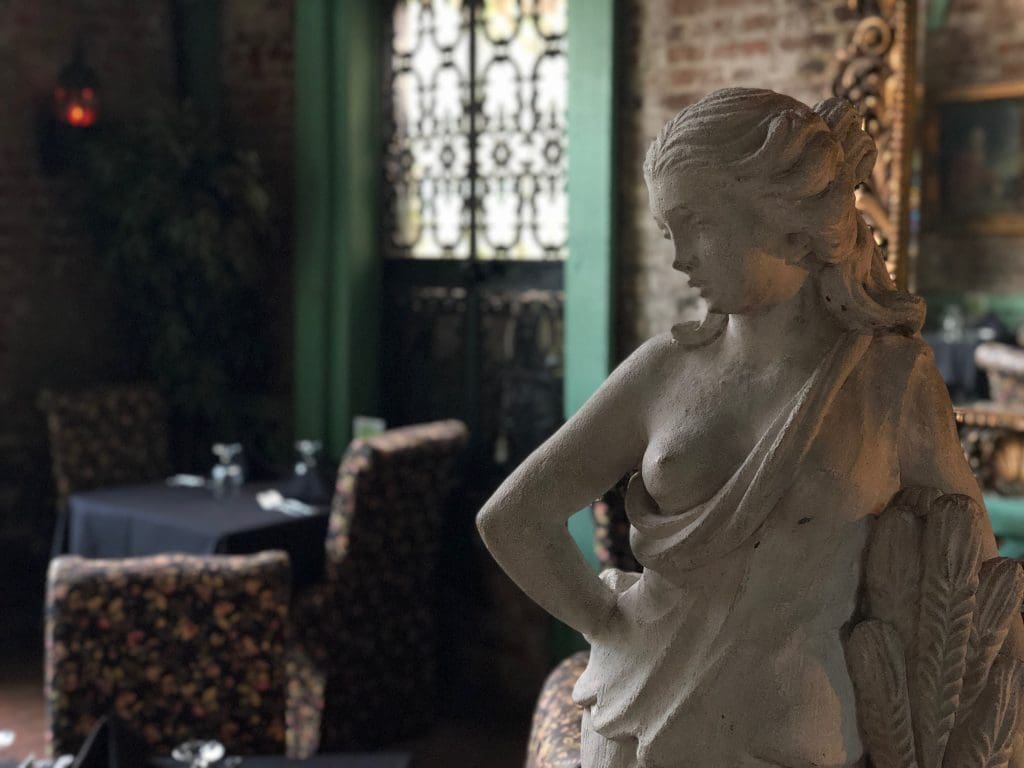
The night that I stayed at Cedar Grove, I went down to grab a beer from the bar. The bartender was kind enough to share the following two stories that she’s experienced, one of which had just happened last night.
There are several buildings on the premises that house all 33 rooms. One building, close to the main house by the pool, sits near the parking area. There are two rooms in this building. Last night, the guests in one of those rooms called and complained about the guests in the adjoining room. They were being too loud. It sounded as if they were moving furniture in there and the TV volume was ridiculous. I had to let them know that there were no other guests in that building…..nor were there any guests on that side of the house closest to the building. Another time, I was outside and saw a man walking down the hill. That’s not a big deal, but something about where he came from and what he was wearing was just weird. So, I started watching him to make sure nothing suspicious was going on. He continued down the hill for a few seconds more and he simply disappeared. There’s nowhere to hide or disappear to. He was just gone.
– Bartender
My personal experiences at Cedar Grove were very tame. No weird noises or creepy apparitions, though I did hear lots of great stories from the staff.
The only interesting thing that happened during our stay was a photo that I took at night inside the main house. On the surface, there’s not much to it, but looking in the mirror, there’s a figure that looks like it could be the form of a human in a gray shirt/sweater/coat (I was wearing a black t-shirt). This was a long exposure and I’m very familiar with cameras and how they work. It’s possible that someone was standing there when I snapped the photo, then moved to create the blur during the long exposure. I shoot architecture for a living, so I’m usually quite aware of when someone is in my shot; especially in reflections (because those are difficult to edit out). I never noticed anyone. Based on their positioning in the photo and the height of everything around it, my best guess is that the person was close to my height (6’4″). This person would have needed to be behind me and to my left. It could also be a number of other things. I would categorize it as mildly interesting over paranormal without more evidence to the contrary.
Overall, it was a very cool place that’s enveloped with interesting history. I’d definitely like to go back in the future. Next time, I’ll have to stay in the Grant Room.
Interesting Fact about Vicksburg
On July 4, 1863, after a long seige and one of the bloodiest battles to take place during the Civil War, the Confederates of Vicksburg surrended to the Union Army. Following the surrender, reports of Union soldier pillaging, rape, murder, theft, and humiliation began to grow. Sherman acknowledged that it probably happened, though he claims that he would never sanction such behavior and punished it in instances that were brought to his attention. Due to this behavior and subsequent misery placed on the citizens of Vicksburg, the city did not officially celebrate the Fourth of July as a national holiday for more than 80 years.


